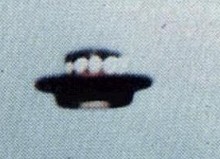
Mainstream Science and UFOs
"In their public statements (but not necessarily in their private statements), scientists express a generally negative attitude towards the UFO problem, and it is interesting to try to understand this attitude. Most scientists have never had the occasion to confront evidence concerning the UFO phenomenon. To a scientist, the main source of hard information (other than his own experiments' observations) is provided by the scientific journals. With rare exceptions, scientific journals do not publish reports of UFO observations. The decision not to publish is made by the editor acting on the advice of reviewers. This process is self-reinforcing: the apparent lack of data confirms the view that there is nothing to the UFO phenomenon, and this view works against the presentation of relevant data." Dr. Peter A. Sturrock, Professor of Space Science and Astrophysics and Deputy Director of the Center for Space Sciences and Astrophysics at Stanford University; Director of the Skylab Workshop on Solar Flares in 1977. (Sturrock, Peter A., "An Analysis of the Condon Report on the Colorado UFO Project," Journal of Scientific Exploration, Vol. 1, No. 1, 1987.)
articles & documents
Curious, Creative and Critical Thinking
Peter Sturrock, Center for Space Science and Astrophysics, Stanford University
In this essay, I will argue that scientists need at least three modes of thought that I call "curious," "creative" and "critical." These requirements, though they may be quite general in their applicability, come sharply into focus when one deals with anomalies within mainstream science or with anomalous phenomena that seem to reside outside of science as we know it.
Science and the Failure To Investigate Unidentified Aerial Phenomena (PDF)

Leslie Kean
Despite intense public interest, there has been no independent, federally financed scientific research conducted on these phenomena since the flawed and biased 1969 Condon report.
Science in Default - Twenty-Two Years of Inadequate UFO Investigations

James E. MacDonald, 1969
"No scientifically adequate investigation of the UFO problem has been carried out during the entire 22 years that have now passed since the first extensive wave of sightings of unidentified aerial objects in the summer of 1947." Presented at the American Association for the Advancement of Science Symposium on UFOs in 1969.
Science, Proof And The "UFO"
Val Germann
Here is one of the stickiest wickets in the whole field of Ufology. The debunkers all say "where is the proof?" And the "Ufologists" keep trying to turn themselves into physicists and produce it. But the plain facts are these: If there is a another, non-human intelligence operating on the Earth then "science" could be of little help and there may be no "proof" available except as these "others" desire. R
Science, Secrecy, and Ufology
Richard Dolan, Feb/March 2000, UFO Magazine
Secrecy permeates the UFO field. What does this mean for Ufology as a science? Answer: the field cannot really be handled scientifically within the public domain. The great model is the Manhattan Project. When a project is undertaken at highly classified levels, you will find nothing of value about it within the mainstream. This was true during the development of the atomic bomb in the 1940s; it is true regarding the UFO.
Scientific Inference (Sturrock Panel Report on UFO Physical Evidence)
Peter Sturrock / Sturrock Panel Report / Physical Evidence Related to UFO Reports
In attempting to resolve a complex problem such as that posed by UFO reports, one is very much in the "gray area" of scientific research that is not well defined: the facts are to some extent shaky; some of the hypotheses are speculative; and it is not clear how to evaluate the hypotheses on the basis of the facts and of other relevant information. R
Still in Default

Bruce S. Maccabee, Ph.D., 1986 MUFON International Symposium Proceedings
For nearly 40 [more than 50] years, the science establishment has ignored the UFO problem, relegating it to the domain of “true believers and mental imcompetents” (a.k.a. "kooks and nuts"). Scientists have participated in a "self-cover-up" by refusing to look at the credible and well reported data. Furthermore, some of those few scientists who have studied UFO data have published explanations which are unconvincing or just plain wrong and have "gotten away with it" because most of the rest of the scientific community has not cared enough to analyze these explanations. The general rejection of the scientific validity of UFO sightings has made it difficult to publish analyses of good sightings [in refereed journals of establishment science].
The Limits of Science in UFO Research
Richard M. Dolan, 2002 International MUFON Symposium
Article presented at the 2002 MUFON Symposium, the theme of which was: "Unity in Ufology: Connecting with the Scientific Community."
UFO's and Mainstream Science
Bernard Haisch, Ph. D., Editor-in-Chief, Journal of Scientific Exploration, published in THE MUFON UFO JOURNAL, No. 335, March 1996
Even if the UFO phenomenon should turn out to be deeper than we imagine, even should it prove to transcend science as we know it, the scientific approach is the only feasible way in the real, political, economic, technological world we live in to give us some chance to control our dealings with this phenomenon, rather than letting the phenomenon entirely control us... if such it is.
What Is The Responsibility Of The Scientist?
J. Allen Hynek, Foreword to CHALLENGE TO SCIENCE - UFO ENIGMA by Jacques Vallee, 1966
WHAT is the responsibility of the scientist confronted with observations that seem not only a challenge but sometimes also an affront to science? How does one discharge this responsibility? The UFO phenomena presents us with such a problem. To most scientists who have no acquaintance with the subject, save that gained from scanning the popular press, it is an "untouchable" area. Flying saucers indeed!-the product of immature, imaginative, and even unbalanced minds, the playground of the pseudo-scientist and the quasi-mystic, the haven of the crackpot.





